1. Early Life and Background
Marcus Junius Brutus's early life was shaped by his distinguished lineage, significant family connections, and a rigorous education that instilled in him a strong sense of republicanism and Stoic philosophy.
1.1. Family and Ancestry
Brutus was born late in 85 BC to Marcus Junius Brutus the Elder and Servilia Caepionis. His father, a provincial governor and tribune of the plebs in 83 BC, was killed by Pompey in 77 BC during Sulla's proscriptions, a detail that would later complicate Brutus's political allegiances. His mother, Servilia, was the half-sister of the staunch republican Cato the Younger and later became Julius Caesar's mistress. This close relationship between Servilia and Caesar led some ancient sources to speculate that Caesar might have been Brutus's biological father, though modern scholars largely reject this as chronologically improbable, given Caesar was only fifteen when Brutus was born.
After his father's death, Brutus was adopted by his maternal uncle, Quintus Servilius Caepio, and for a period, he officially used the name Quintus Servilius Caepio Brutus, though he rarely used this legal name. Brutus proudly traced his ancestry to Lucius Junius Brutus, the semi-legendary founder of the Roman Republic, who famously expelled the last Roman king, Lucius Tarquinius Superbus, in 509 BC and was one of the first two consuls. This lineage deeply influenced Brutus's political identity and his unwavering commitment to republican principles. His maternal ancestors also included Gaius Servilius Ahala, another figure revered for defending liberty by killing Spurius Maelius.
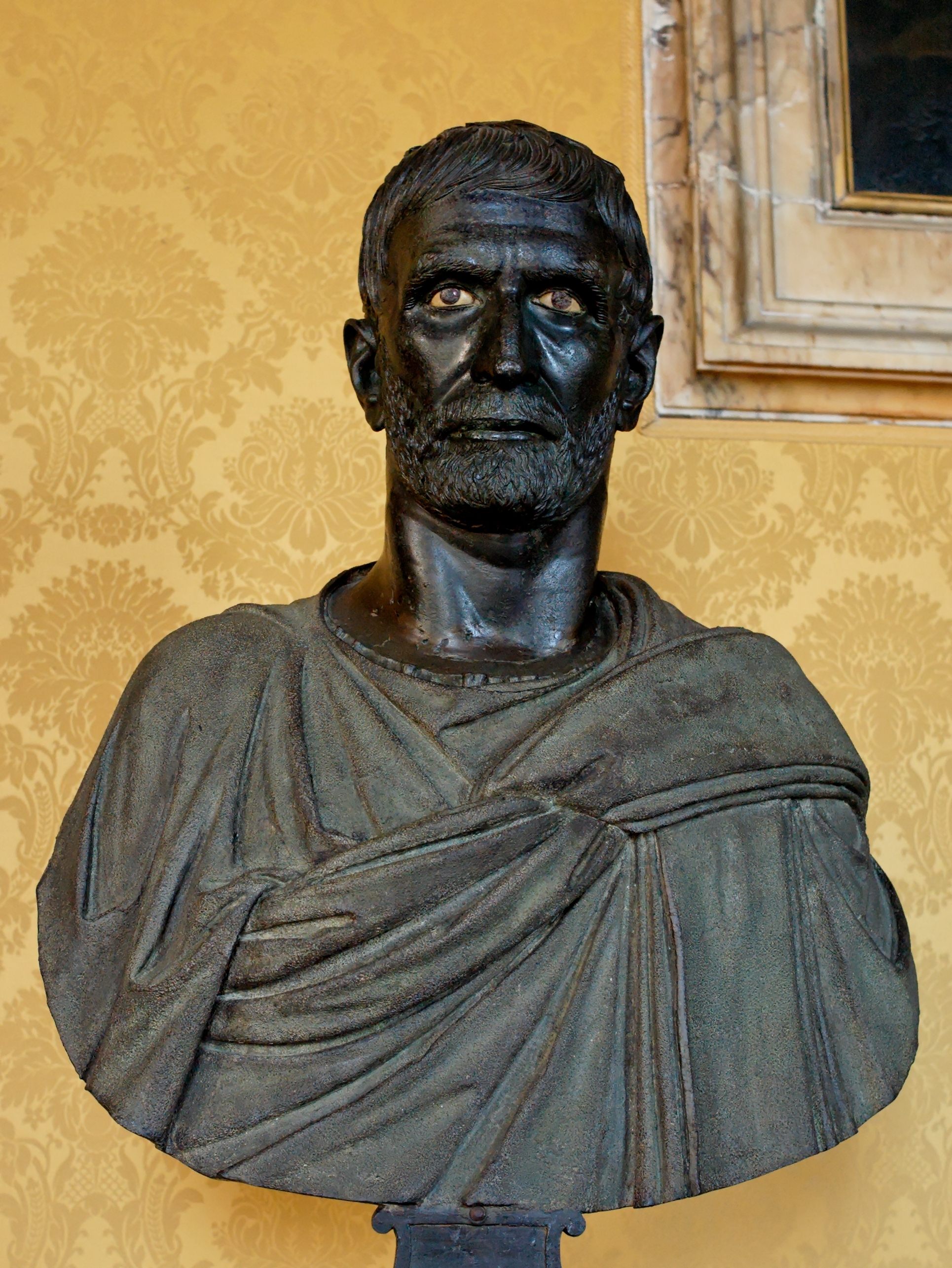
1.2. Education and Influences
Brutus received a comprehensive education in the intellectual centers of the Roman world, including Athens, Pergamum, and Rhodes. During his studies, he was deeply exposed to Stoic philosophy, which emphasized civic virtue, duty, and the pursuit of justice, even at great personal cost. These philosophical tenets profoundly shaped his worldview and political actions.
A particularly significant influence on Brutus was his maternal uncle, Cato the Younger. Cato, a rigid and unyielding defender of republicanism, served as a moral compass for Brutus, reinforcing his dedication to civic virtue and his opposition to any form of autocratic rule. Brutus's first foray into public life was as an assistant to Cato when the latter was appointed governor of Cyprus in 58 BC, further solidifying Cato's impact on his political and ethical development.
2. Early Political Career
Brutus's early political career saw his progression through Roman offices and his increasing involvement in public life, where he consistently demonstrated his growing influence and adherence to republican principles.
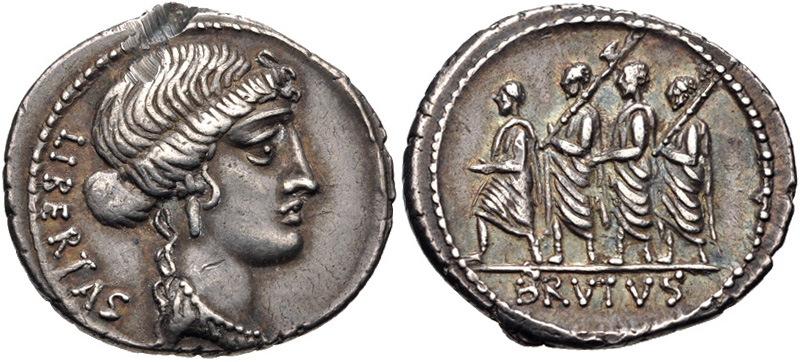
In 59 BC, during Caesar's consulship, Brutus was implicated in the Vettius affair, accused by Lucius Vettius of plotting to assassinate Pompey. However, Vettius quickly changed his story, dropping Brutus's name, suggesting political maneuvering behind the accusation.
In 54 BC, Brutus served as triumvir monetalis, one of three officials responsible for minting coins. During his tenure, he issued denarii featuring portraits of his paternal ancestor, Lucius Junius Brutus, and his maternal ancestor, Gaius Servilius Ahala, both celebrated as defenders of liberty in the early Republic. He also minted a second type depicting Libertas, the goddess of liberty. These coins clearly demonstrated Brutus's admiration for early Roman tyrannicides and served as propaganda against Pompey's perceived autocratic ambitions.
2.1. Quaestorship and Service in Cilicia
Brutus was elected as quaestor in 53 BC, which automatically enrolled him in the Roman Senate. He then traveled to Cilicia with his father-in-law, Appius Claudius Pulcher, who served as proconsul there the following year. While in Cilicia, Brutus engaged in money-lending, a practice that later drew criticism. Two years later, when Cicero was appointed proconsul of Cilicia (51-50 BC), he discovered Brutus's financial activities. Brutus had made two significant loans: one to Ariobarzanes, the king of Cappadocia, and another to the town of Salamis.
The loan to Salamis was particularly controversial. Although officially made by two of Brutus's friends, it carried an exorbitant annual interest rate of 48 percent, far exceeding Cicero's imposed cap of 12 percent. The loan, dating back to 56 BC, was illegal under the lex Gabinia for Romans to lend to provincials in Rome. Brutus, using his influence in the Senate, had the contract, officially in his friends' names, confirmed. One of Brutus's agents, Marcus Scaptius, even resorted to force to coerce repayment in Cilicia, which Cicero intervened to stop. Cicero, while not wanting to jeopardize his friendship with Brutus, was disappointed and angered by Brutus's misrepresentation of the loan and its usurious interest rate.
2.2. Opposition to Pompey
In 52 BC, following the death of his uncle-in-law Publius Clodius Pulcher, Brutus wrote a pamphlet titled De Dictatura Pompei (On the Dictatorship of Pompey). In this work, he vehemently opposed calls for Pompey to be made dictator, asserting that "it is better to rule no one than to be another man's slave, for one can live honourably without power but to live as a slave is impossible." This stance was more radical than that of his uncle Cato the Younger, who supported Pompey's elevation to sole consul in 52 BC, believing "any government at all is better than no government." Brutus also wrote in defense of Titus Annius Milo, connecting Milo's killing of Clodius to the welfare of the state and criticizing what he viewed as Pompey's abuses of power. This pamphlet was highly regarded by later rhetoricians.
In the late 50s BC, Brutus was elected as a pontifex, a public priest responsible for supervising the calendar and maintaining Rome's relationship with the gods. It is likely that Caesar supported his election, despite Brutus having previously declined Caesar's invitation to serve as a legate in Gaul, choosing instead to accompany Appius Pulcher to Cilicia. Brutus also actively participated in major trials, collaborating with renowned advocates like Cicero and Quintus Hortensius. In 50 BC, he played a significant role in defending his father-in-law, Appius Claudius, against charges of treason and electoral malpractice.
Leading up to Caesar's Civil War in 49 BC, Brutus's precise views were largely unrecorded, though he maintained a tactical silence. Cicero's letters suggest that Caesar attempted to court Brutus, even speaking of avenging the death of Brutus's father, in the period preceding the civil war.
3. Caesar's Civil War
Brutus's involvement in the civil war between Caesar and Pompey was a period of shifting loyalties, ultimately leading to his reconciliation with Caesar, a decision that would later highlight the complex relationship between the two men.
3.1. Allegiance to Pompey
When Caesar's Civil War erupted in January 49 BC, Brutus faced a difficult choice. Despite Pompey being responsible for his father's death, Brutus decided to side with Pompey. This decision was largely driven by his close political affiliations with the Optimate faction, which included his allies such as Appius Claudius, Cato, and Cicero, all of whom joined Pompey. Brutus did not immediately join Pompey, first traveling to Cilicia as a legate for Publius Sestius before joining Pompey in Greece in late 49 BC or early 48 BC.
3.2. Pardon and Service under Caesar
It is uncertain whether Brutus actively fought in the battles of Dyrrhachium and Pharsalus. However, after Pompey's decisive defeat at Pharsalus on 9 August 48 BC, Brutus fled to Larissa and wrote to Caesar, who graciously welcomed him into his camp and granted him amnesty. This act of mercy by Caesar towards a former opponent, especially one whose father he had killed, underscored the complex and often personal nature of their relationship.
While Caesar pursued Pompey to Alexandria in 48-47 BC, Brutus worked to reconcile various Pompeians with Caesar. He returned to Rome in December 47 BC. Caesar further extended his favor by appointing Brutus as governor (likely as legatus pro praetore) of Cisalpine Gaul while Caesar departed for Africa to confront Cato and Metellus Scipio. After Cato's suicide following his defeat at the Battle of Thapsus in April 46 BC, Brutus eulogized his uncle in a pamphlet titled Cato, praising Cato's life while also acknowledging Caesar's clementia (clemency).
In March 45 BC, after Caesar's final battle against the republican remnants, Brutus divorced his wife Claudia in June and promptly remarried his cousin, Porcia, Cato's daughter, later that month. According to Cicero, this marriage caused a minor scandal as Brutus offered no valid reason for divorcing Claudia other than his desire to marry Porcia. While the reasons for this remarriage are unclear-it could have been motivated by love or a political move to align himself with Cato's supporters-Brutus still maintained good relations with Caesar at this point. Porcia, however, did not get along with Brutus's mother, Servilia, and Cicero noted their open resentment towards each other. Caesar continued to favor Brutus, promising him the prestigious urban praetorship for 44 BC and potentially earmarking him for the consulship in 41 BC.
4. Assassination of Julius Caesar
The assassination of Julius Caesar was a pivotal moment in Roman history, driven by fears of Caesar's monarchical ambitions and Brutus's deep-seated republican ideals.
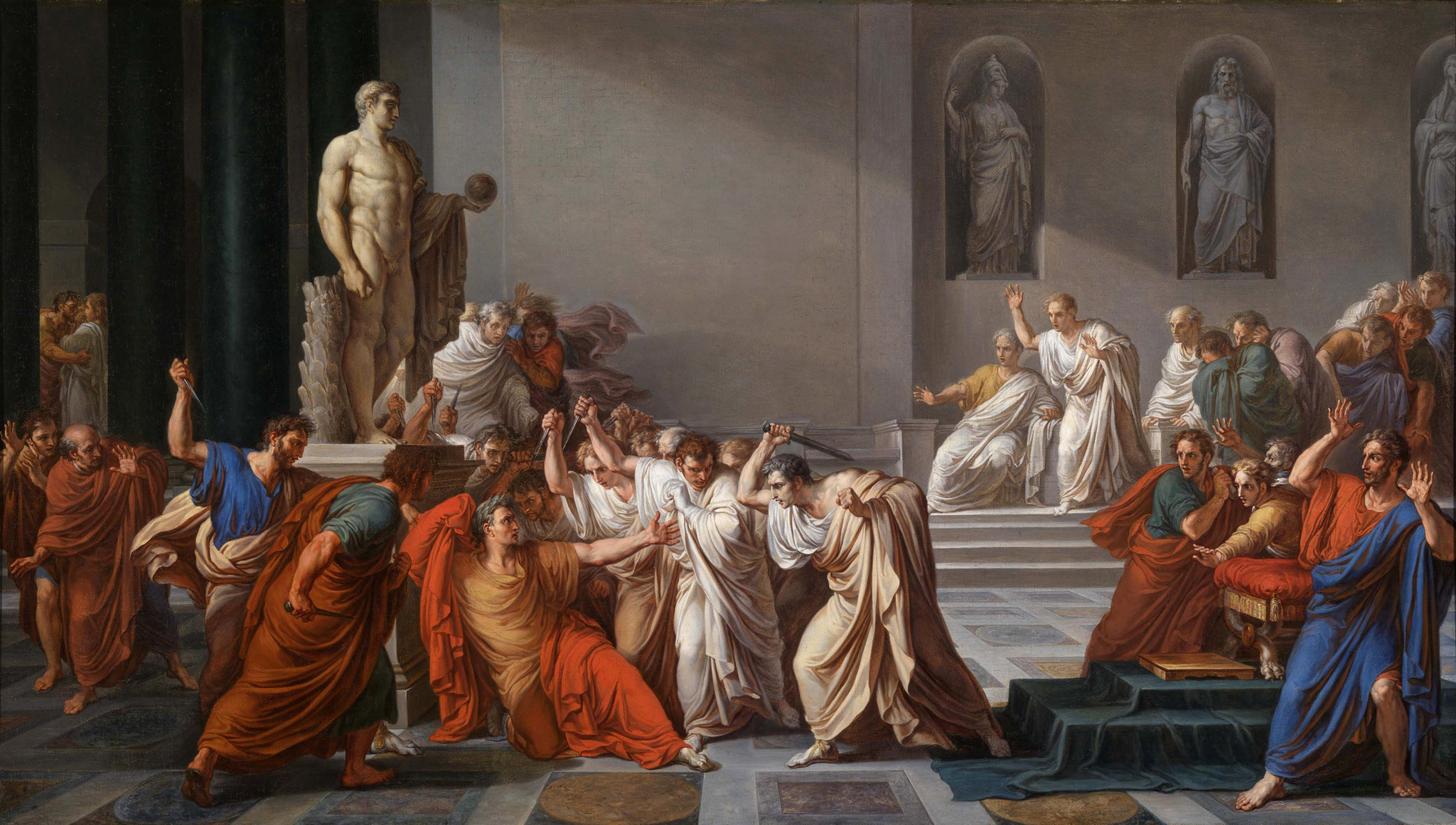
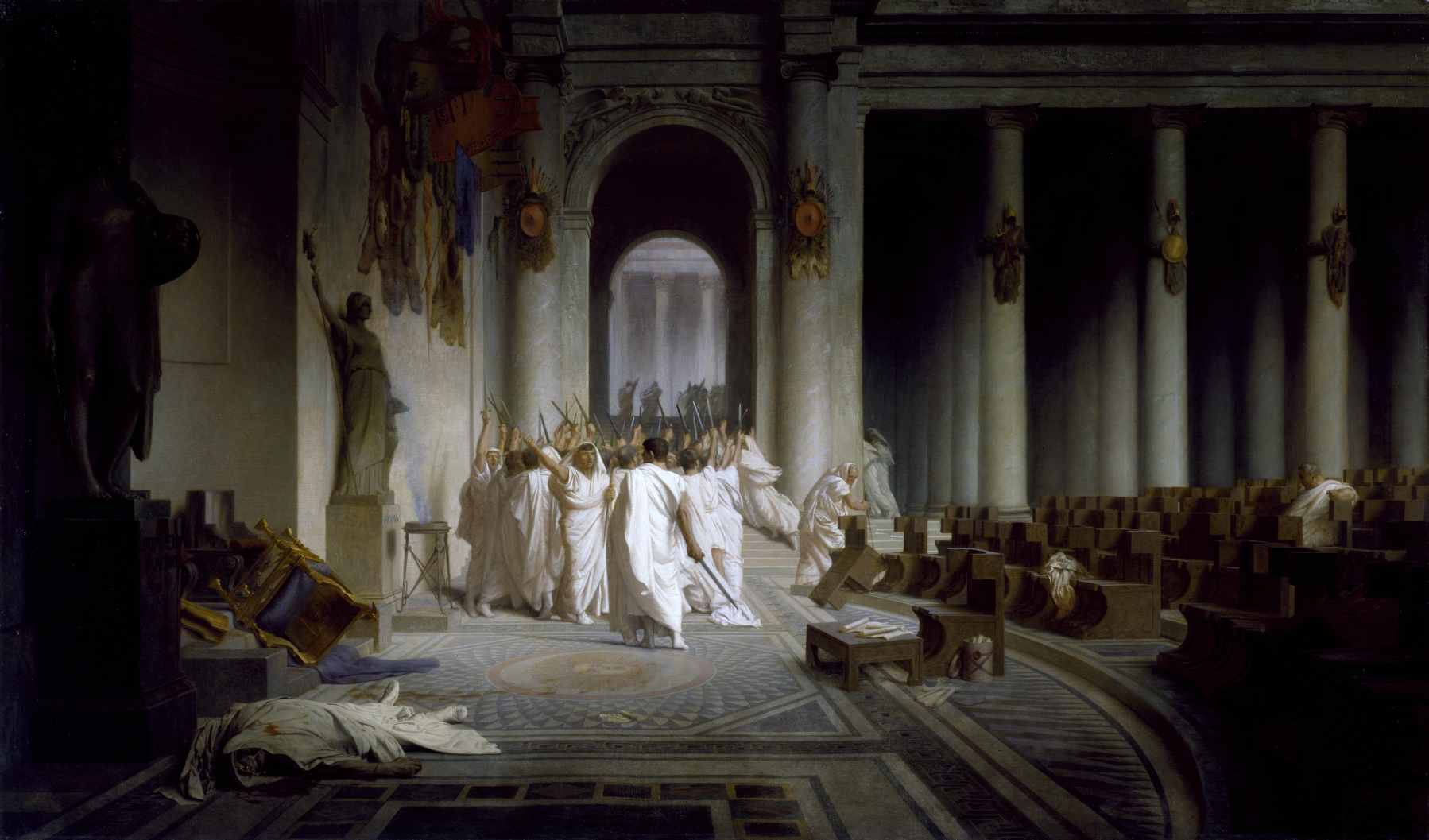
4.1. Conspiracy and Motives
By autumn 45 BC, public opinion of Caesar began to sour. Ancient sources, including Plutarch, Appian, and Cassius Dio, reported graffiti glorifying Brutus's ancestor Lucius Junius Brutus, criticizing Caesar's kingly ambitions, and derogatory comments made to Marcus Junius Brutus in Rome's public courts, urging him to live up to his family's legacy. While Dio suggested this public support came from the common people, Plutarch claimed the graffiti was created by elites to shame Brutus into action. Modern historians believe that at least some segment of popular opinion had turned against Caesar by early 44 BC.
Caesar's actions further fueled these fears. In late January 44 BC, he deposed two plebeian tribunes for removing a crown from one of his statues, undermining his own justification for the civil war-defending the rights of the tribunes. In February 44 BC, Caesar thrice publicly rejected a crown offered by Mark Antony, yet he later accepted the title dictator perpetuo (dictator for life or for an undetermined term), which solidified fears of his monarchical ambitions.
Cicero also wrote letters encouraging Brutus to reconsider his association with Caesar. While Cassius Dio claimed Brutus's wife Porcia spurred his involvement, the extent of her influence remains debated. Gaius Cassius Longinus, a praetor and former legate of Caesar's, was instrumental in forming the conspiracy. Plutarch suggested Brutus approached Cassius at Porcia's urging, while Appian and Dio claimed Cassius approached Brutus.
Caesar's increasing control over the political system stifled the ambitions of many aristocrats of Brutus's generation. His dictatorship closed traditional avenues for political success, transforming it from a competitive achievement to a grant from Caesar. This reduction of the Senate to a mere rubber stamp eliminated genuine political debate, leaving no room for policy-making except through Caesar's direct approval. Brutus, an active writer and thinker in the Platonic philosophical tradition, believed in a duty to restore justice and overthrow tyrants, aligning with the conspirators' goals.
Regardless of its initial formation, Brutus, Cassius, and Brutus's cousin and Caesar's close ally, Decimus Junius Brutus, began recruiting conspirators in late February 44 BC. They enlisted figures such as Gaius Trebonius, Publius Servilius Casca, and Servius Sulpicius Galba. A debate arose among the conspirators about whether Antony should also be killed; Brutus forcefully rejected this, either believing Antony could be swayed or wanting to avoid the appearance of purging the Caesarian elite rather than solely removing a tyrant.
Various plans for the assassination were considered, including an ambush on the Via Sacra, an attack during elections, or a killing at a gladiator match. Ultimately, the conspirators settled on a Senate meeting on the Ides of March. This date held symbolic importance, as consuls traditionally assumed office on that day until the mid-2nd century BC. The reasons for choosing the Ides are debated: Nicolaus of Damascus suggested a Senate meeting would isolate Caesar, while Appian noted the possibility of other senators aiding the assassins. Both are considered unlikely given Caesar's expanded Senate and the small number of conspirators. More plausibly, Dio suggested it offered a tactical advantage, as only the conspirators would be armed by smuggling in weapons.
4.2. The Ides of March
Ancient sources often embellish the events of the Ides of March with ignored omens, spurned soothsayers, and unread warnings, adding to the dramatic and tragic narratives of Caesar's death. The plan involved Trebonius detaining Antony, who was serving as co-consul with Caesar, outside the Senate house. Caesar was then stabbed almost immediately upon entering. The specific details vary among authors: Nicolaus of Damascus reported around eighty conspirators, Appian listed only fifteen, and the number of wounds on Caesar ranged from twenty-three to thirty-five.
Plutarch reported that Caesar yielded to the attack after seeing Brutus participate. Dio claimed Caesar shouted in Greek, καὶ σύ, τέκνονkai su teknon?Greek, Ancient ("You too, child?"). Suetonius, however, cited Caesar's friend Lucius Cornelius Balbus as saying the dictator fell in silence, with the possibility that kai su teknon was a later addition. Given that dramatic death quotes were common in Roman literature, the historicity of the quote is debated. The use of kai su could imply a curse, according to classicists James Russell and Jeffrey Tatum.
Immediately after Caesar's death, senators fled in chaos, none attempting to aid Caesar or move his body. Cicero reported that Caesar fell at the foot of Pompey's statue. His body was only moved after nightfall, carried home to his wife, Calpurnia. The conspirators then proceeded to the Capitoline Hill. Caesar's deputy, Marcus Aemilius Lepidus, moved a legion of troops from the Tiber Island into the city, surrounding the forum. Suetonius stated that Brutus and Cassius initially planned to seize Caesar's property and revoke his decrees but hesitated due to fear of Lepidus and Antony.
Before Lepidus's troops reached the forum, Brutus addressed the people in a contio (public assembly). The text of his speech is lost. Dio claimed the liberatores promoted democracy and liberty, assuring the people they would not be harmed. Appian stated they merely congratulated each other and recommended the recall of Sextus Pompey and the tribunes Caesar had recently deposed. Public support was lukewarm, despite other speeches supporting the tyrannicide. Publius Cornelius Dolabella, who was to become consul days later, immediately assumed the consulship illegally, expressed support for Brutus and Cassius, and joined the liberatores on the Capitoline.
Cicero urged the tyrannicides to convene the Senate to secure its support, but Brutus instead sent a delegation to the Caesarians, seeking a negotiated settlement. This might have been influenced by family ties, as Lepidus was married to one of Brutus's sisters, or Brutus might have believed Antony could be persuaded. The Caesarians delayed for a day, using the time to move troops and gather weapons for a potential conflict. Ancient sources also reported a series of "self-evidently fantastic" prodigies and miraculous occurrences after Caesar's death, though some supposed prodigies were unrelated events, such as a comet seen months later or Mount Etna erupting at a different time.
4.3. Aftermath and Departure from Rome
The initial plan of Brutus and Cassius was to establish a period of calm and work towards a general reconciliation. While the Caesarians had troops near the capital, the liberatores were soon to control vast provincial holdings in the East, providing them with significant armies and resources within a year. Recognizing their initial military disadvantage, the liberatores ratified Caesar's decrees to retain their magistracies and provincial assignments, aiming to protect themselves and rebuild the republican front.
Cicero brokered a compromise: a general amnesty for the assassins, ratification of Caesar's acts and appointments for the next two years, and guarantees for Caesar's veterans to receive their promised land grants. Caesar was also to receive a public funeral. Had this settlement held, the Republic might have resumed, with Decimus confirmed as consul in 42 BC, holding elections for 41 BC. The people celebrated the reconciliation, but some hard-core Caesarians remained convinced that civil war would follow.
Caesar's funeral on March 20 featured a rousing speech by Antony, mourning the dictator and galvanizing opposition against the tyrannicides. While some ancient sources reported the crowd setting the Senate house on fire and initiating a witch-hunt for the tyrannicides, these might be embellishments. Contrary to Plutarch's account, the assassins remained in Rome for several weeks after the funeral, until April 44 BC, suggesting some popular support for them. A person claiming to be Marius, a descendant of Gaius Marius, plotted to ambush Brutus and Cassius. Brutus, as urban praetor, secured a special dispensation to leave the capital and withdrew to his estate in Lanuvium. This fake Marius was later executed for his threats. Dolabella, the other consul, independently dismantled an altar and column dedicated to Caesar.
By early May, Brutus considered exile. Octavian's arrival and the fake Marius caused Antony to lose some veteran support, prompting him to tour Campania-officially to settle Caesar's veterans, but actually to bolster military backing. Dolabella at this time sided with the liberatores. Antony's brother, Lucius Antonius, helped Octavian publicly announce his intention to fulfill Caesar's will, which included handing enormous wealth to the citizenry. Brutus also disseminated speeches defending his actions, emphasizing Caesar's invasion of Rome, killing of prominent citizens, and suppression of popular sovereignty.
By mid-May, Antony began planning against Decimus Brutus's governorship in Cisalpine Gaul, bypassing the Senate to reassign the province by popular law in June. He also proposed reassigning Brutus and Cassius from their provinces to purchase grain in Asia and Sicily. A meeting at Brutus's house, attended by Cicero, Brutus, Cassius, and Brutus's mother, saw Cassius declare his intent to go to Syria, while Brutus, though initially wanting to return to Rome, ended up going to Greece. His initial plan for Rome was to hold games in early July commemorating his ancestor Lucius Junius Brutus and promoting his cause, but he delegated this to a friend. Octavian also held games commemorating Caesar later that month, around which time the liberatores began earnest preparations for civil war.
5. Liberators' Civil War
The assassination of Caesar ignited a new civil war, pitting the "Liberators" led by Brutus and Cassius against the formidable forces of the Second Triumvirate.
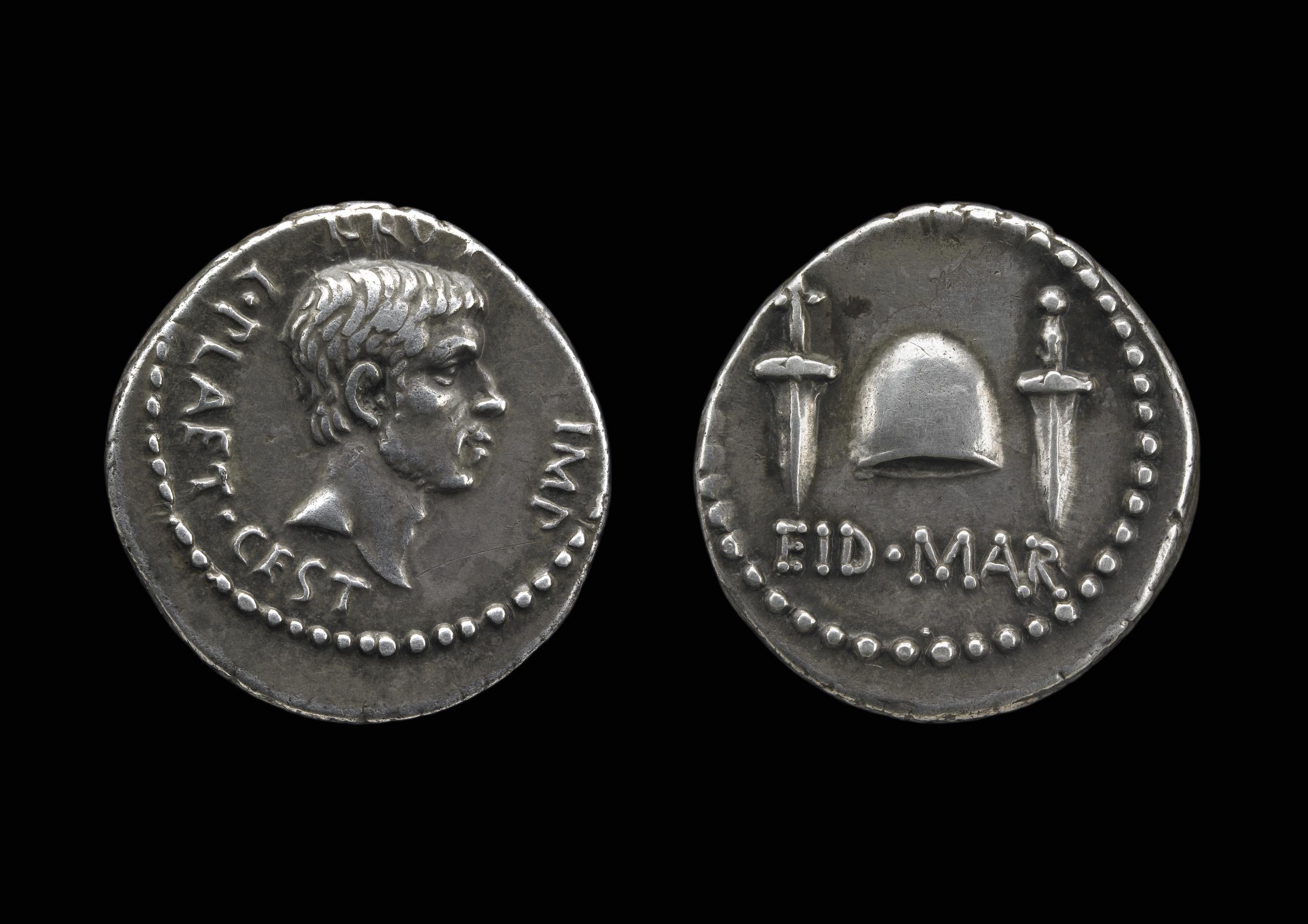
5.1. Preparations in the East
In early August, the Senate assigned Brutus to Crete and Cassius to Cyrene, both small, insignificant provinces with few troops. Later that month, Brutus departed Italy for the East. He was warmly received in Greece by younger Romans studying in Athens, recruiting many supporters from among them. He discussed with the governor of Macedonia the possibility of taking over the province. Although Antony in Rome had allocated Macedonia to his brother Gaius, Brutus marched north with an army into Macedonia, bolstered by funds collected by two outgoing quaestors at year's end.
In January 43 BC, Brutus entered Macedonia with his army and captured Antony's brother, Gaius. Simultaneously, the political situation in Rome turned against Antony as Cicero delivered his Philippics. Over the next few months, Brutus consolidated his strength in Greece. In Italy, the Senate, at Cicero's urging, fought against Antony at the Battle of Mutina, where both consuls, Hirtius and Pansa, were killed. During this period, the republicans enjoyed Senate support, which confirmed Brutus's command in Macedonia and Cassius's in Syria.
Dolabella switched sides in 43 BC, killing Trebonius in Syria and raising an army against Cassius. Brutus decamped for Syria in early May, writing to Cicero to criticize his policy of supporting Octavian against Antony. At the same time, the Senate declared Antony an enemy of the state. In late May, Lepidus (married to Brutus's half-sister)-possibly forced by his own troops-joined Antony against Cicero, Octavian, and the Senate, prompting Brutus to ask Cicero to protect both his and Lepidus's families. The next month, Brutus's wife, Porcia, died.
Cicero's strategy of uniting Octavian with the Senate against Antony and Lepidus began to falter in May. He requested Brutus to march his forces to Italy in mid-June. It appears Brutus and Cassius in the East experienced substantial communication delays and failed to realize that Antony had not been decisively defeated, contrary to earlier assurances after Mutina. Over the next few months, from June to August 19, Octavian marched on Rome and forced his election as consul. Shortly thereafter, Octavian and his colleague, Quintus Pedius, passed the Lex Pedia, retroactively making the murder of a dictator illegal and convicting Brutus and the other assassins in absentia. The new consuls also lifted the Senate's decrees against Lepidus and Antony, paving the way for a general Caesarian rapprochement. Under this law, Decimus was killed in the West in autumn, effectively ending the republican cause there. By November 27, 43 BC, the Caesarians had fully resolved their differences and passed the Lex Titia, forming the Second Triumvirate and instituting a series of brutal proscriptions that claimed many lives, including Cicero's.
When news of the Triumvirate and their proscriptions reached Brutus in the East, he marched across the Hellespont into Macedonia to quell rebellion and conquered several cities in Thrace. After meeting Cassius in Smyrna in January 42 BC, both generals embarked on a campaign through southern Asia Minor, sacking cities that had aided their enemies.
Brutus's portrayal by some authors, like Appian, suffered considerably from this eastern campaign, during which Brutus marched into cities like Xanthus, enslaving their populations and plundering their wealth. Other ancient historians, including Plutarch, adopted a more apologetic tone, depicting Brutus regretting the violence with tears. This was a common ancient literary device to excuse and praise morally condemnable actions, such as pillaging. The campaign continued with less sacking but more coerced payments. Ancient accounts of this shift are divided, with Appian suggesting eastern willingness to surrender stemmed from stories of Xanthus's destruction, while Cassius Dio and Plutarch viewed the later portions of the campaign as emblematic of Brutus's virtues of moderation, justice, and honor. By the end of the campaign in Asia Minor, both Brutus and Cassius had amassed tremendous wealth. They reconvened at Sardis and marched into Thrace in August 42 BC.
6. Battle of Philippi and Death
The decisive military engagements at Philippi marked the end of the republican resistance led by Brutus and Cassius.
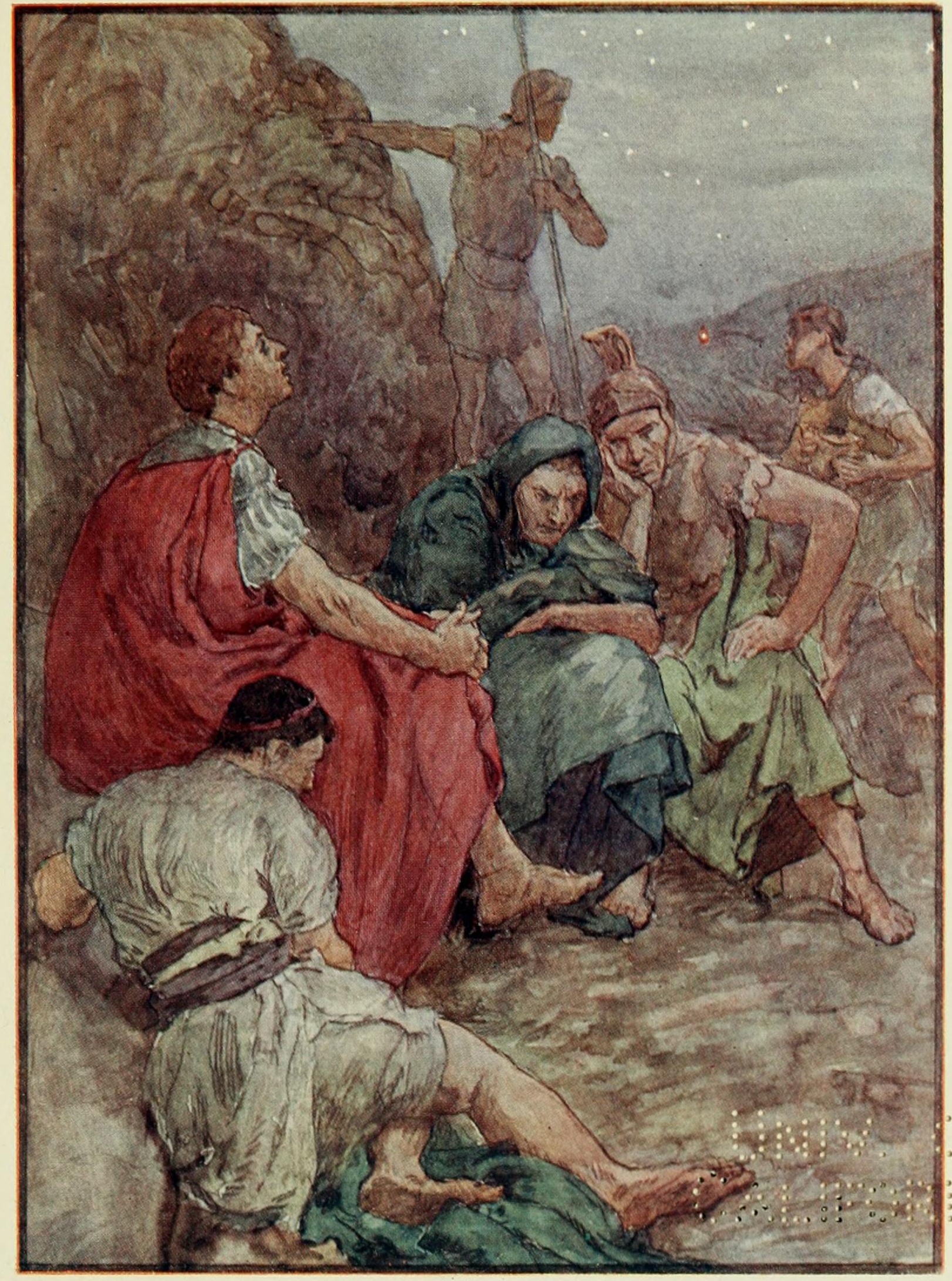
6.1. The Battles of Philippi
The Caesarians, led by Octavian and Antony, marched into Greece, successfully evading the naval patrols of Sextus Pompey, Lucius Staius Murcus, and Gnaeus Domitius Ahenobarbus. The liberatores had positioned themselves west of Neapolis, ensuring clear lines of communication to their supplies in the East. Octavian and Antony were less fortunate, as their supply lines were harassed by the superior republican fleets, prompting the liberatores to adopt a strategy of attrition.
Octavian and Antony commanded approximately 95,000 infantry and 13,000 horsemen, while Brutus and Cassius had about 85,000 infantry and 20,000 cavalry. Flush with cash from their eastern campaigns, the liberatores also held a substantial financial advantage, paying their soldiers in advance with 1,500 denarii per man, and more for officers. Antony moved swiftly to force an immediate engagement, constructing a causeway under cover of darkness into the swamps that anchored the republican left flank. Cassius, commanding the republican left, countered by building a wall to cut off Antony from his men and defend his own flank.
In the ensuing first Battle of Philippi, the precise start of the engagement is unclear. Appian stated Antony attacked Cassius, whereas Plutarch reported the battle began almost simultaneously. Brutus's forces on the republican right flank decisively defeated Octavian's troops, sacking Octavian's camp and forcing the young Caesar to withdraw. However, Cassius's troops fared poorly against Antony's men, compelling Cassius to retreat to a hill. Two accounts follow regarding Cassius's death: Appian reported that Cassius heard of Brutus's victory and killed himself out of shame. All other sources, however, described how one of Cassius's legates failed to relay the news of Brutus's victory, leading Cassius to mistakenly believe Brutus had been defeated, which prompted his suicide.
6.2. Cassius' Death
Following the first battle, Brutus assumed command of Cassius's army, promising a substantial cash reward. He also likely promised his soldiers that they could plunder Thessalonica and Sparta after victory, as these cities had supported the triumvirs.
6.3. Brutus' Defeat and Suicide
Fearful of defections among his troops and the possibility of Antony cutting his supply lines, Brutus engaged in a second battle after attempting for some time to continue the original strategy of starving the enemy out. The resulting second Battle of Philippi was a direct, head-to-head struggle, with sources reporting few tactical maneuvers but heavy casualties, particularly among eminent republican families.
After the defeat, Brutus fled into the nearby hills with approximately four legions. Knowing his army was defeated and that capture was inevitable, he took his own life by falling on his sword. According to Plutarch, among his last words were, "By all means must we fly, but with our hands, not our feet." Brutus also reportedly uttered a well-known verse from Euripides' Medea, calling down a curse: "O Zeus, do not forget who has caused all these woes." It is unclear whether Brutus was referring to Antony, as Appian claimed, or Octavian, as Kathryn Tempest believes. Plutarch also stated that Brutus praised his friends for not deserting him before encouraging them to save themselves.
Some sources report that Antony, upon discovering Brutus's body, ordered it to be wrapped in his most expensive purple mantle and cremated as a show of great respect, with the ashes sent to Brutus's mother, Servilia. Suetonius, however, reported that Octavian had Brutus's head cut off and planned to display it before a statue of Caesar, but it was thrown overboard during a storm in the Adriatic Sea.
7. Chronology
- 85 BC:** Brutus is born to Marcus Junius Brutus and Servilia.
- 58 BC:** Serves as assistant to Cato, the governor of Cyprus, marking the beginning of his political career.
- 54 BC:** Marries Claudia, daughter of Appius Claudius Pulcher.
- 53 BC:** Serves as quaestor in Cilicia, where his father-in-law is governor.
- 52 BC:** Opposes Pompey's growing power and defends Milo after the death of Publius Clodius Pulcher.
- 49 BC:** The Civil War begins in January. Brutus joins the Pompeian party against Caesar, serving as legate to Publius Sestius in Cilicia, then joining Pompey in Greece late in the year.
- 48 BC:** Pompey is defeated at Pharsalus on 9 August; Brutus is pardoned by Caesar.
- 46 BC:** Caesar appoints Brutus governor of Cisalpine Gaul, before defeating the remnants of the Pompeians at Thapsus in April.
- 45 BC:** Caesar appoints him praetor urbanus for 44 BC. He divorces Claudia and marries Porcia Catonis.
- 44 BC:** Caesar takes the title of dictator perpetuo. Brutus and the other liberatores assassinate Caesar on the Ides of March (March 15). He leaves Italy for Athens in late August, then travels to Macedonia.
- 42 BC:** Brutus campaigns successfully in southern Asia Minor in January. In September and October, his forces are defeated by the triumvirs at the Battle of Philippi, and he commits suicide.
8. Family
Marcus Junius Brutus belonged to the distinguished Junia gens. His parents were Marcus Junius Brutus the Elder and Servilia Caepionis. Servilia was the half-sister of Cato the Younger, making Cato Brutus's maternal uncle and a significant influence on his life. Servilia was also known to be the mistress of Julius Caesar.
Brutus was married twice. His first wife was Claudia Pulchra, the daughter of Appius Claudius Pulcher. He married Claudia around 54 BC. In 45 BC, he divorced Claudia and promptly remarried his cousin, Porcia Catonis, the daughter of Cato the Younger. This second marriage, while politically significant, was reportedly a source of tension between Brutus and his mother, Servilia.
Brutus had several half-sisters through his mother Servilia's second marriage to Decimus Junius Silanus. These included Junia Prima, Junia Secunda, and Junia Tertia. Junia Tertia was married to Gaius Cassius Longinus, Brutus's co-conspirator in Caesar's assassination. Junia Secunda was married to Marcus Aemilius Lepidus, one of the members of the Second Triumvirate, creating a complex web of familial and political connections.
9. Legacy and Evaluation
Brutus's historical character has undergone numerous reinterpretations throughout history, remaining a divisive figure. His legacy is often viewed through the lens of his central act: the assassination of Julius Caesar.
9.1. Ancient and Medieval Views
In the ancient world, Brutus's legacy was a subject of substantial debate. Immediately after his death, he was already seen by some as having killed Caesar for virtuous reasons, rather than out of envy or hatred. Plutarch, in his "Life of Brutus" from Parallel Lives, noted that even Brutus's enemies respected him, recounting that Antony once said Brutus was "the only man to have slain Caesar because he was driven by the splendour and nobility of the deed, while the rest conspired against the man because they hated and envied him."
Brutus's own writings, particularly his pamphlets of 52 BC against Pompey's dictatorship (De dictatura Pompei) and in support of Milo (Pro T. Annio Milone), portrayed him as philosophically consistent and motivated solely by principle. Cicero, in his De Officiis, expressed that the conspirators' act, including Brutus's, was a moral duty. However, the main charge against Brutus in the ancient world was ingratitude, viewing him as ungrateful for accepting Caesar's goodwill and support only to kill him. A more negative historiographical tradition depicted Brutus and his compatriots as criminal murderers.
Despite this, during the Augustan age, historians reportedly wrote respectfully about Brutus and the other conspirators, and Augustus himself was said to tolerate positive views of Brutus. However, the Forum of Augustus, which included statues of various republican heroes, notably omitted figures like Cato the Younger, Cicero, Brutus, and Cassius, indicating a selective remembrance of republican ideals.
By the reign of Tiberius, views on Brutus became less tolerant. The historian Cremutius Cordus was charged with treason for writing a history too favorable to Brutus and Cassius. Around the same time, Valerius Maximus, writing with imperial support, believed Brutus's memory suffered from "irreversible curses." During this period, admiration for Brutus and Cassius was often interpreted as a protest against the imperial system. The Stoic philosopher Seneca the Younger argued that since Caesar was a good ruler, Brutus's fear was unfounded, and he failed to consider the consequences of Caesar's death. Nevertheless, by the time Plutarch wrote his Life of Brutus, "the oral and written tradition had been worked over to create a streamlined, and largely positive, narrative of Brutus' motives." Some high imperial writers, including Pliny the Younger and Tacitus, admired his rhetorical skills, with Tacitus writing, "in my opinion, Brutus alone among them laid bare the convictions of his heart frankly and ingeniously, with neither ill-will nor spite."
9.2. Renaissance and Modern Views
In the 12th century, the English writer John of Salisbury, who owned a copy of De Officiis, echoed Cicero's defense of tyrannicide as a moral obligation. Thomas Aquinas initially agreed with Cicero's defense of Brutus but later changed his views, suggesting that while tyrants could be overthrown in certain circumstances, mild tyrants should be tolerated to avoid unintended consequences.
Dante Alighieri's Inferno famously placed Brutus in the lowest circle of Hell for his betrayal of Caesar, where he (along with Cassius and Judas Iscariot) is personally tortured by Satan. Dante's condemnation had a theological dimension: by killing Caesar, Brutus was seen as "resisting God's 'historical design'"-the development of the Roman Empire and its eventual fusion with Christianity and the Christianized monarchies of Dante's era.
Renaissance writers, however, tended to view Brutus more positively, as his assassination of Caesar symbolized ancient republican ideology. Various figures in the Renaissance and early modern periods were named or adopted the name Brutus: in 1537, the "Florentine Brutus," Lorenzino de' Medici, killed his cousin Duke Alessandro to allegedly free Florence. The French pamphlet Vindiciae contra tyrannos (Defences against tyrants) was published in 1579 under the pseudonym Stephanus Junius Brutus. The "British Brutus," Algernon Sidney, was executed in 1683 for allegedly plotting against Charles II. Brutus also featured prominently in early modern arts, particularly in William Shakespeare's Julius Caesar, which depicted him as "more of a troubled soul than a public symbol... [and] often sympathetic."
9.3. Modern Perspectives
Views of Brutus as a symbol of republicanism have persisted into the modern period. For example, the Anti-Federalist Papers in 1787 were written under the pseudonym "Brutus," alongside other Roman republican names like Cato and Poplicola, reflecting his enduring association with anti-tyrannical thought.
However, some 18th-century writers, such as Conyers Middleton and Edward Gibbon, held negative views. Middleton believed Brutus's vacillations in correspondence with Cicero betrayed his claims to philosophical consistency. Gibbon assessed Brutus's actions based on their consequences: the destruction of the republic, civil war, death, and future tyranny. Modern historians, however, view such teleological assessments skeptically. Ronald Syme, for instance, noted that "to judge Brutus because he failed is simply to judge from the results."
The influential History of Rome by Theodor Mommsen in the late 19th century delivered a "damning verdict on Brutus" by concluding with Caesar's reforms in 46 BC and asserting that Caesar "had some sort of solution to the problem of how to deal with Rome's growing empire" (though no such description survives). Similarly, views of Brutus are often tied to assessments of the Republic itself: those who believe the Republic was beyond saving or in inevitable decline, perhaps influenced by hindsight, tend to view him more negatively. Ultimately, there remains little consensus on Brutus's actions as a whole.
10. In Popular Culture
Marcus Junius Brutus, as a figure embodying themes of liberty, betrayal, and complex morality, has been widely represented in various forms of popular culture.
- In Jonathan Swift's 1726 satire Gulliver's Travels, Lemuel Gulliver visits the island of Glubbdubdrib and encounters historical figures, including Caesar and Brutus. Caesar confesses that his glory does not equal the glory Brutus gained by murdering him.
- In Colleen McCullough's Masters of Rome novels, Brutus is portrayed as a timid intellectual with a deeply complex relationship with Caesar. He resents Caesar for breaking his marriage arrangement with Caesar's daughter, Julia, whom Brutus loved, so she could marry Pompey. Despite this, Brutus enjoys Caesar's favor after being pardoned for fighting against him at the Battle of Pharsalus. Leading up to the Ides of March, Cassius and Trebonius use Brutus as a figurehead due to his family connections to the Republic's founder. He appears in Fortune's Favourites, Caesar's Women, Caesar, and The October Horse.
- Brutus is an occasional supporting character in Asterix comics, most notably as the main antagonist in Asterix and Son. The character also appears in the first three live-action Asterix film adaptations: briefly in Asterix & Obelix Take On Caesar (played by Didier Cauchy) and Asterix at the Olympic Games. In the latter, he is a central, comical villain portrayed by Benoît Poelvoorde, despite not appearing in the original comic book. The film implies he is Julius Caesar's biological son.
- In the TV series Rome, Brutus, portrayed by Tobias Menzies, is depicted as a young man torn between his beliefs and his loyalty and love for Caesar, who has been like a father to him. The series portrays his personality and motives with some inaccuracies, depicting him as an unwilling participant in politics, often inebriated, and easily swayed by emotion in earlier episodes. His relationship with Cato and the presence of his three sisters and wife Porcia are omitted.
- The Hives' song "B is for Brutus" contains titular and lyrical references to Junius Brutus.
- Red Hot Chili Peppers' song "Even You Brutus?" from their 2011 album I'm with You references both Brutus and Judas Iscariot.
- The video game Assassin's Creed: Brotherhood features a side story through the "Scrolls of Romulus," written by Brutus, which reveals Caesar as a Templar and Brutus and the conspirators as members of the Roman Brotherhood of Assassins. Completing this quest grants the player Brutus's armor and dagger. In Assassin's Creed Origins, Brutus and Cassius appear as Aya's earliest recruits, with Brutus delivering the killing blow to Caesar, though his armor from Brotherhood is not featured.